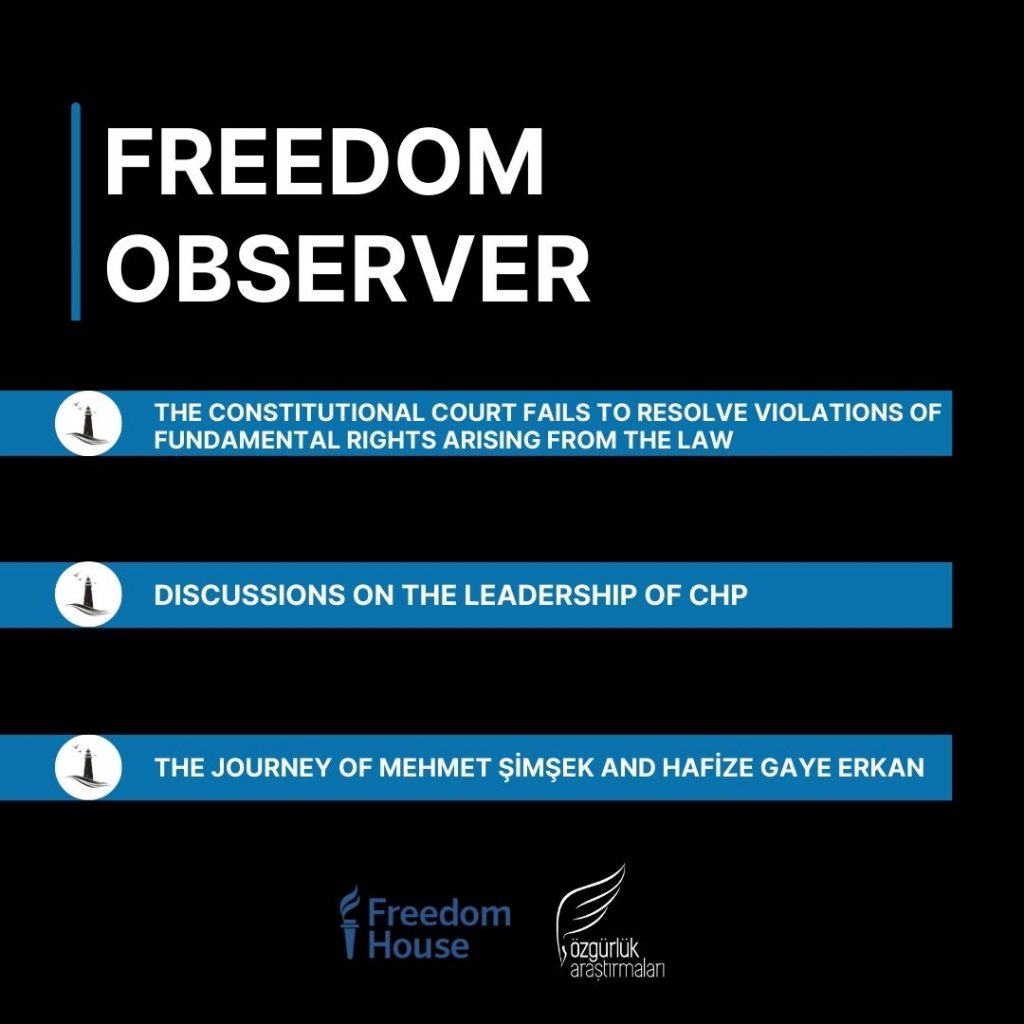
From Editor-in-Chief
In the May 14-28 elections, the “People’s Alliance,” which consists primarily of the AKP-MHP alliance, gained dominance in both the legislative and executive branches. This led to two significant developments in domestic politics. Firstly, Tayyip Erdoğan, who has returned to the presidency, has seemingly reinstated Mehmet Şimşek as the leader of the economy, aligning with the prevailing public expectations. In our previous editorial, we highlighted that “putting a particular person in charge of the economy cannot magically resolve economic issues” and that “the primary concern, as in all public spheres, is to repair the institutional damage caused in recent years.”
Although Mehmet Şimşek, who has been appointed as the Minister of Treasury and Finance, has made a sensible statement about the “program” he intends to implement, starting with the phrase “Turkey has no choice but to return to a rational ground,” the initial indications in the economy, which do not inspire much optimism, almost validate our earlier prediction. The main reason for pessimism is the ongoing depreciation of the Turkish lira against the US dollar and the euro. Another reason for pessimism stems from President Erdoğan appointing former Central Bank Governor Şahap Kavcıoğlu, one of the individuals accountable for the unfavorable course of events, as the head of the BRSA without Şimşek’s knowledge. This creates the impression that President Erdoğan will not allow Minister Şimşek to position his team in crucial roles within the economy and pursue a comprehensive and internally consistent policy.
Likewise, President Erdoğan’s announcement to maintain his previous approach to interest rates has also raised doubts about whether a fundamental structural transformation of the economy and public finance will be allowed, to repair institutional damage and restore stability. On the other hand, the appointment of Mehmet Şimşek as the head of the economy has not yielded the optimistic impact that markets and international organizations had anticipated. However, it is premature to be entirely pessimistic.
The second significant development in domestic politics is that the election results have ignited new debates within the CHP, particularly regarding Kemal Kılıçdaroğlu’s presidential position. It is not surprising that parties when they fail to achieve their desired outcome in general elections, question the party leaders and policies that are held responsible for the perceived “defeat.” However, claiming that Kılıçdaroğlu’s results in the presidential election, achieved through the alliance he formed, were a failure lacks a factual basis. In reality, Kılıçdaroğlu, as the joint candidate of the Millet Alliance, outperformed his party’s previous candidate by 15 points in the 2018 presidential election and by 20 points in the May 14 election. It should be noted that these results were obtained under extremely unfair conditions. Furthermore, such success would have been unattainable with any other candidate contesting the presidential election besides Kılıçdaroğlu.
However, those who confidently claim that Ekrem İmamoğlu, if nominated instead of Kılıçdaroğlu, would be more successful and win the presidency are merely indulging in wishful thinking. The debate within the CHP also seems to be less about genuine introspection aimed at identifying and addressing the real causes of the party’s perceived “failure.” Instead, it appears to be an attempt by a faction, which is uncomfortable with Kılıçdaroğlu’s efforts to free the party from its long-standing narrow ideological constraints and the influence of certain factions, to seize control of the party by changing its chairman.
If the CHP has any chance of “salvation,” it lies not in the hands of politicians whose principles are unknown and who are predominantly supported by nationalists, but in the leadership of Kılıçdaroğlu. He has been actively pursuing a policy of loosening the ideological structure of the CHP, which has its roots in the single-party era and trying to broaden the party’s appeal by using more inclusive language. While Kılıçdaroğlu’s progress in this direction may not have been entirely satisfactory so far, it does not necessarily mean that any of the individuals mentioned in the news reports, even if they had embraced this goal (which is highly doubtful), would have been more successful than Kılıçdaroğlu.
In addition to these developments in domestic politics, we must also consider a matter closely related to Turkey’s foreign policy and the hopes of our society for a free and democratic future. This pertains to the recent developments in the Council of Europe’s “infringement procedure,” which has now become a protracted issue triggered by the unjust conviction of Osman Kavala, who has been detained since October 18, 2017. The Council of Europe’s Committee of Ministers will reconvene in September to decide whether to suspend or expel Turkey from membership if Kavala is not released by then. Furthermore, the Committee has once again warned Turkey that it will initiate a “violation procedure” concerning Selâhattin Demirtaş.
Political authorities and our judiciary need to understand the gravity of this situation. It is evident that if the Council of Europe decides to expel Turkey, the consequences would be disastrous for our country. This goes beyond a mere human rights issue; the political fallout of being labeled a consistent violator of human rights would result in increased isolation from Europe and closer alignment with authoritarian regimes such as Russia, Iran, and China. Such a scenario would not only shatter the hopes of our people for freedom and democracy but also lead to economic exclusion from the civilized world, leaving us as a struggling and impoverished society.
Lastly, I would like to highlight a problem related to judicial justice, specifically individual applications made to the Constitutional Court. The Constitution and the relevant laws do not clearly outline the course of action the Constitutional Court should take when rights violations arise directly from the law itself, rather than from administrative or judicial decisions. This legal gap presents a significant challenge, and the current approach taken by the Court involves sending violation decisions to the Grand National Assembly of Turkey for legislative amendments. In the following article, our colleague A. Rıza Çoban discusses whether this approach provides a genuine solution and emphasizes the delays and difficulties it creates for individuals seeking to reclaim their violated rights.
We hope to bring you more optimistic articles, news, and commentary in our upcoming issue.
* Prof. Dr. Mustafa Erdoğan
The Constitutional Court Fails to Resolve Violations of Fundamental Rights Arising from the Law
The Constitutional Court faces difficulties in finding a resolution when fundamental rights violations stem from the law. Law No. 6216 does not provide clear guidance on this matter. Originally, there was a provision in the draft law, Article 49, paragraph six, which stated that if a violation arose from the law, the relevant section would refer the issue to the General Assembly of the Constitutional Court. However, this provision was later removed during the commission’s work due to concerns about granting the Constitutional Court the authority to initiate lawsuits on its own. Although the provision was removed, no alternative solution was introduced to address this problem.
In practice, the Constitutional Court has resorted to sending a copy of its decision to the Parliament in cases where violations are attributed to the law. However, neither the Rules of Procedure of the Turkish Grand National Assembly nor Law No. 6216 specify how to proceed in such instances.
The Constitutional Court has issued notifications to the Turkish Grand National Assembly in three pilot judgments and several other judgments, acknowledging that the violations were a result of the existing laws. However, in only one case, the law was amended following the notification. In other instances, the TGNA did not take any action, leading to the escalation of violations due to the Constitutional Court’s flawed pilot decision practice.
For instance, in the pilot decision regarding Hamit Yakut, the Constitutional Court determined that the offense of “committing a crime on behalf of a terrorist organization without being a member of a terrorist organization,” as regulated in the sixth paragraph of Article 220 of the Turkish Criminal Code, lacked foreseeability in practice. The Court found that individuals exercising their constitutional rights to freedom of assembly and expression were being punished based on this article. Consequently, the Court notified the Parliament to amend the relevant provision. In the same decision, the Court suspended the examination of similar applications for a period of one year. However, since no measures were taken by the Court regarding individuals sentenced under the provision in question, they continued to be deprived of their liberty during the specified period. The Turkish Parliament failed to take any action within the designated timeframe. Two years later, the Court consolidated the pending applications and concluded that the rights of each applicant, including Deniz Yavuncu and others, had been violated.
However, the Constitutional Court has yet to find a definitive solution to remedy the violation. Despite ruling for the retrial of the applicants, the existence of the unchanged provision in the law makes it unlikely that local courts will interpret it differently and issue an acquittal verdict. If such a possibility existed, there would be no need for a pilot judgment in the first place.
The Constitutional Court suggests two approaches to the local courts. The first is to directly apply the international convention instead of the conflicting law, under the framework of Article 90 of the Constitution. However, the Constitutional Court did not need to issue a pilot judgment for this option, as the European Court of Human Rights (ECtHR) had already ruled in the Işıkırık v. Turkey case that the same provision was unforeseeable and conflicted with the Convention. The Constitutional Court could have promptly resolved the victims’ situation by issuing a direct violation decision.
The second suggestion is for the courts handling the retrial to appeal to the Constitutional Court based on Article 152 of the Constitution. However, this suggestion delays the applicants’ access to their rights and, most importantly, results in years of unnecessary imprisonment.
A possible solution to this problem could be if the Constitutional Court’s section responsible for individual applications considers itself as the court hearing the case and objects to the unconstitutional law by bringing it before the General Assembly. It is evident that the Constitutional Court, based on historical interpretation, is hesitant to utilize a power not recognized by the legislature. However, during the legislative process, Constitutional Court officials stated that this route was available and did not object to the removal of the problematic provision from the draft law. If this approach is not favored, an amendment to Law No. 6216 and the Rules of Procedure of the Grand National Assembly of Turkey should be made to compel the amendment of the provision that violates constitutional rights.
* Ali Rıza Çoban – Constitutional Lawyer
Discussions on the Leadership of CHP
After the electoral defeats on May 14 and May 28, internal debates have emerged within the main opposition party, the Republican People’s Party (CHP). Kemal Kılıçdaroğlu, who has faced criticism following the elections, continues to face opposition from within the party for not resigning as the CHP chairman. Kılıçdaroğlu’s failure to provide transparency, take responsibility, and be accountable for the election results, as well as the risk of losing metropolitan municipalities in the upcoming local elections and the demand for new leadership in the party, have not been adequately addressed by Kılıçdaroğlu and other party elites. In response to calls for his resignation, Kılıçdaroğlu stated, “We will persist in our path with faith and determination” and “As the captain, I will lead the ship to the harbor,” indicating his refusal to step down from the chairmanship.
It is evident that the party elites have also disregarded the longstanding public demand for Ekrem İmamoğlu to become the party’s chairman. Kılıçdaroğlu, referring to the prominent figures mentioned for the party presidency, emphasized the need to prioritize the collective interest over individual expectations, stating, “When it comes to the homeland, the rest is nothing.” However, it is not a democratic approach for Kılıçdaroğlu to use the collective interest as a means to protect his own unquestionable leadership.
The behavior of opposition party elites, especially within the CHP, following the electoral defeat, demonstrates that undemocratic principles and practices in Turkey are not exclusive to the ruling party but can also persist within opposition parties. Unfortunately, the current structure, supported by the Law on Political Parties, makes it challenging to reverse this undemocratic functioning. As long as the top-down and bottom-up election mechanism, engineered by party staff, continues between delegates and the chairman, it appears unlikely to end the leadership oligarchy within political parties and the asymmetry between merit and loyalty in top management positions without a crisis.
* Ömer Faruk Şen – Ph.D. – Missouri University
The Journey of Mehmet Şimşek and Hafize Gaye Erkan
As you know, these bulletins are written to address issues related to institutional capacity. While contemplating the clearest indicator of an institutional or general collapse of capacity, I felt the need to revisit previous issues of the bulletin you are currently reading. We have published approximately 40 bulletins since 2020. Starting with the bulletin I wrote on October 7, 2020, I highlighted Recep Tayyip Erdoğan, Berat Albayrak, Lütfü Elvan, Naci Ağbal, Şahap Kavcıoğlu, Nurettin Nebati, and Murat Uysal in descending order of significance. These individuals have all surpassed the capacities of their respective institutions. If only these names had been recognized as leaders and pioneers while they were still aligned with their institutions. Unfortunately, the situation is quite the opposite. Except for Elvan and Ağbal to some extent, almost all of these individuals have focused on increasing Erdoğan’s personal management capacity and influence, rather than preserving the institutional capacity they were entrusted with. The way these individuals are referred to, separate from the functioning and human resources of the institutions, serves as a strong indication of the institutional collapse that we have been reporting on in our bulletins.
Adding to the list of names mentioned above, we now have a new “DUO”: Mehmet Şimşek and Hafize Gaye Erkan. As you may have observed in last week’s newsletter, Erdoğan conducted an election campaign that relied less on promises and more on securitization politics. Although I thought it was unlikely for the Şimşek move to occur after the election, Erdogan surprised me by making this move. Şimşek, a former minister well-known for his achievements, has returned to a ministerial position. However, this time he faces a much more formidable task: Erdogan’s persistent interest rate policy. In fact, during a plane journey on June 14, Erdoğan made the following statement to journalists close to him, “Of course, some friends should not be under the misapprehension that ‘the President is making a serious change in interest rate policies’. I am of the same opinion here. However, considering the current perspective of our Minister of Treasury and Finance, we have accepted that he should swiftly and easily take the necessary steps in collaboration with the Central Bank. We wished him ‘good luck’ and thus expressed our determination to reduce inflation to single digits.”
The keyword here is “accepted.” Erdoğan does not say “we accepted”; he conveys that he reluctantly, hesitantly, and grudgingly permitted Şimşek to implement his policies. He emphasizes the limited time available and the need for swift implementation of any measures. Frankly speaking, I found it peculiar that Erdoğan made the move involving Şimşek, but I presumed that if he did, Şimşek would be in a very strong position. However, Erdoğan’s statements indicate that Şimşek’s influence is actually quite weak. Perhaps Şimşek’s tenure as a minister will be shorter than initially anticipated.
* Enes Özkan – Economist, Istanbul University





